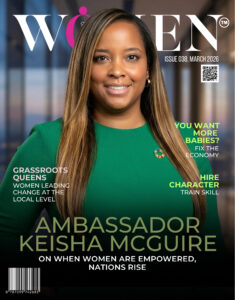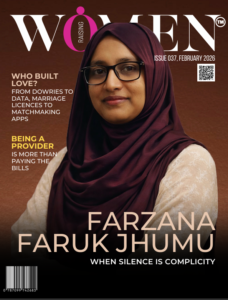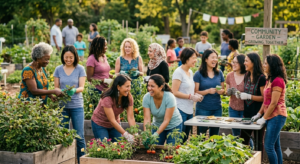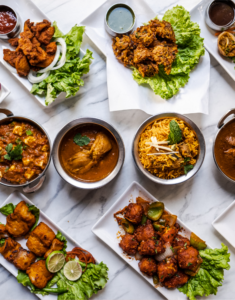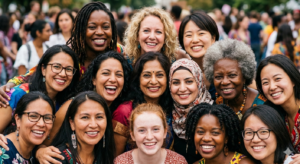Who is Raising the Voice of Women and Girls in Nigeria
By May Ikeora
Hon. Dr. Tajudeen Abbas, Speaker of the 10th House of Representatives
Hon. Dr. Tajudeen Abbas is a distinguished Nigerian politician and academic who currently serves as the Speaker of the 10th House of Representatives. Born on October 1, 1963, in Zaria, Kaduna State, Dr. Abbas holds multiple academic qualifications, including a Ph.D. in Business Management from Usmanu Danfodiyo University, Sokoto. Before entering politics, he served as a university lecturer, contributing extensively to academia and research.
In 2011, Dr. Abbas transitioned into politics, representing Zaria in the House of Representatives. Known for his dedication and legislative acumen, he has sponsored numerous bills, making significant contributions to Nigeria’s legislative landscape. Dr. Abbas’s leadership as Speaker reflects his commitment to advancing Nigeria’s legislative processes and fostering progress on national issues. His tenure so far is marked by a focus on unity and policy reform, emphasizing his vision for a more responsive and effective House of Representatives. Raising Women Magazine interviewed the Honourable Speaker following is recent focus on amplyfying the voices of women and girls in Nigeria.
As Speaker of the House of Representatives, you have actively promoted policies aimed at empowering women and girls. Can you share some of the key initiatives or laws you have championed to support gender equity in Nigeria?
Thank you so much for this interview, and for acknowledging the work we dedicate ourselves to daily in the House, on behalf of the Nigerian people. Since being elected Speaker, my first priority has been to listen, particularly to women-led organizations and NGOs who have been waiting for a receptive ear in the National Assembly. It’s long been my belief that there is no issue that dialogue cannot address. Through open and honest conversations, we can arrive at solutions that are equitable and all-inclusive.
Recognizing the significance of this, I decided that my doors would always remain open to women-focused and women-led NGOs that advocate for legislative progress on a variety of issues. These organizations bring forward diverse, important agenda that reflect the needs and aspirations of Nigerian women. To coordinate and support these efforts effectively, we launched the Bridge Her Gap Initiative, housed in the office of my Special Assistant on Women Affairs, Yeside Olasimbo Aminat. This initiative serves as a central command centre to harmonize and support the legislative priorities of women-focused organizations. Its goals are ambitious: advancing women’s representation in Parliament, expanding economic opportunities, and creating policies that empower women across all spheres.
Through this initiative, we are amplifying women’s voices within Parliament, supporting critical bills on issues such as widows’ rights, gender representation, and more. Bridge Her Gap plays a crucial role in building momentum and mobilizing public and legislative support for women-centered bills. A recent example is the passage of the Anti-Sexual Harassment in Tertiary Educational Institutions Bill. This landmark legislation, achieved in partnership with Gender Mobile Initiative, underscores our commitment to protecting the dignity and rights of Nigerian women and girls.
In addition, we have a comprehensive Memorandum of Understanding (MOU) with the UN Women, covering ten vital thematic areas. These include Women’s Economic Empowerment, Prevention of Violence Against Women and Girls, and Increasing Women’s Leadership. This MOU is more than a formality; it is a framework guiding our legislative priorities and ensuring our efforts are aligned with global best practices.
There is much work ahead, and I am privileged to be supported by a diligent and knowledgeable team dedicated to advancing women’s rights and opportunities. Together, we are working to ensure that the National Assembly remains a place where the voices of Nigerian women are heard, respected, and acted upon.
Your role in the recent International Day of the Girl-Child was both symbolic and impactful. What inspired your involvement, and how do you envision such events shaping the future for young girls in Nigeria?
As I mentioned earlier, I am fortunate to work with a team of exceptionally dedicated and forward-thinking individuals. They keep me informed on upcoming events and consistently suggest the most impactful legislative interventions. When they first brought this particular idea to me, they were initially hesitant, fearing it might be too bold.
However, I did not see it that way at all; to me, it was a brilliant and meaningful step, a way to move from words to concrete action. I saw it as an opportunity to show the Nigerian girl child, who may not have witnessed Patricia Etteh’s leadership when she served as Speaker, that it is possible not only to become a Member of Parliament but also to aspire to the role of Speaker.
… As leaders, we should encourage the girl child to aspire to the top. I must say that the day I gave Ms. Isabel Anani, a 16-year-old gender advocate, the opportunity to preside plenary in a symbolic and unprecedented manner, was one of the happiest days of my life as a lawmaker, a father and a Nigerian.”
Our work in advancing women’s causes within the House is substantial and ongoing. For instance, the Constitution Review Committee is tackling critical issues related to women’s rights and representation. Whatever we can do to further the cause of women’s inclusion and representation, we are committed to pursuing it.
I recognize that some initiatives face challenges due to a lack of support from certain members, often because their constituencies might not yet fully understand or embrace them. However, I see leadership and governance as a partnership, and in the 21st century, I believe it is also a creative process. With collaboration and open-mindedness, we can achieve more, and I have been heartened by the support received from members following our recent initiative. Many of them felt that it was a powerful gesture to advocate for the girl child, showing our commitment as leaders to uplift and inspire.
My hope is that more young girls will see this and feel empowered to pursue their dreams, no matter the field. They should know they have allies in us, that they are supported, and that we believe in their potential to lead and succeed. We are here to encourage them to dream without limitations and to provide a foundation of support that enables them to reach for what might once have felt impossible.
So, I was inspired by the fact that as leaders, we should encourage the girl child to aspire to the top. I must say that the day I gave Ms. Isabel Anani, a 16-year-old gender advocate, the opportunity to preside plenary in a symbolic and unprecedented manner, was one of the happiest days of my life as a lawmaker, a father and a Nigerian.
Gender inclusivity is an important topic in governance. What measures is the House of Representatives taking under your leadership to ensure greater representation of women in the legislative process?
As I mentioned earlier, the Memorandum of Understanding between my office and the UN Women represents a vital partnership in our ongoing efforts to raise awareness, amplify women’s voices, and advocate for their rights. However, I believe firmly in ensuring that any legislative or leadership intervention aligns with the needs and perspectives of Nigerian women. I do not support imposing solutions; instead, I advocate for a collaborative approach, involving women’s organizations in the conversations that directly impact them. It is essential to have their active participation and endorsement in these efforts, and I have been clear about this from the beginning.
Many recommendations have already been presented to the Constitution Review Committee, which includes varied perspectives. Some believe we could draw inspiration from other African or European countries by adopting gender quotas. While this approach has worked elsewhere, there are questions about whether it suits our unique context. Some women’s groups have also raised concerns about the optics and long-term implications of creating special seats exclusively for women, emphasizing that these decisions require careful thought and consensus.
This is indeed a delicate balancing act. Gender bills are regularly introduced in the House, and this is positive because it allows us to engage in meaningful debates, gather insights, and assess the most effective paths forward. Yet, the most crucial stakeholders here are the women-focused organizations and civil society groups working on the ground. Perhaps one way forward could be to develop a comprehensive charter of demands that clearly articulates these groups’ specific goals and recommended interventions. This could serve as a foundation for more structured, informed discussions.
I am open to all ideas and remain committed to my open door policy with women organisations where diverse voices can contribute to shaping policies that support and empower Nigerian women. The legislative journey may be complex, but I believe we can find sustainable and equitable solutions through collective input and a commitment to listening.
As I recently noted during an engagement with some women groups, the issue of having more women in leadership and governance positions is a done deal in the House. What we should be looking forward to in Nigeria is having a female paired with a male in every executive position. For example, if a political party fields a male as its presidential, governorship or chairmanship candidate, the running mate should be a female, and vice versa. I advocated for that during my meeting with them, and going forward, that is what we should be pushing for.
What role do you believe the government should play in creating policies that promote economic empowerment for women, particularly in rural areas?
Engagement is essential. There is no effective way to understand the needs of women, or any community, without direct involvement. As I’ve said before, I do not support imposing solutions that no one has asked for. True empowerment comes from actively engaging with the community, understanding their specific needs, and tailoring solutions accordingly.
As representatives, we are positioned closest to the people, and that makes it our duty to maintain open and consistent communication channels, especially with local leaders in our constituencies. Some constituencies are vast, covering multiple Local Government Areas with diverse needs and expectations. Given this scope, our responsibilities include not only making laws but also providing oversight—an incredibly demanding task. Oversight involves extensive engagements with government agencies, public hearings, investigations, field visits, and committee sessions.
I encourage each representative to collaborate with community leaders. This can be achieved by identifying key figures, such as women leaders within local communities, and setting up regular meetings. Once we can create a timetable for these interactions, we can systematically gather their feedback, understand their concerns, and ensure their voices are reflected in our policy decisions.
Looking forward, what specific policies or reforms do you plan to prioritize that will further the inclusion and empowerment of women in Nigeria?
On this year’s International Women’s Day, I made a commitment to Nigerian women that the House would prioritize the Special Seats for Women Bill. Increasing women’s representation in governance is not just a goal; it’s essential to creating balanced leadership that truly reflects our society. I remain dedicated to this cause, and I am pushing for the practical steps needed to bring about change.
One of my key advocacy areas has been the domestication of essential national laws at the state level—laws like the Violence Against Persons (Prohibition) Act (VAPP), the Child Rights Act, and others that address the rights and protections of women and children.
Without a detailed schedule and plan, this workload can become overwhelming, and unfortunately, community engagement can be one of the first things neglected.
It’ is important to remember that effective policy must emanate from the people. When we build policies rooted in genuine community needs, we are not only addressing immediate concerns but also fostering a legislative environment that is truly representative and responsive.
In many parts of Nigeria, cultural norms still hinder women’s progress. How can lawmakers work with community leaders to break these barriers and create more opportunities for women and girls?
There is a misconception that societies are inherently against women’s progress, but in my experience, that is often not the case. I have yet to meet a father who does not want the best for his daughters. Much of the resistance to change actually stems from a place of fear—fear of the unknown or fear of challenges women might face in new spaces. When a society has not seen women in certain roles before, it can lead to doubts and uncertainty about their success or acceptance. However, I’ve observed that as traditional leaders become more educated and open-minded, these barriers can significantly diminish.
In many cultures, when the traditional heads champion progressive values, we see remarkable strides in women’s rights. Women’s education becomes highly encouraged; they gain rights to own and inherit property; harmful widowhood practices are curbed, and in general, communities start moving forward. That’s why quality leadership at every level is critical.
In the 10th House, we place a high value on engaging traditional rulers, recognizing the influence they wield within their communities. They are always well-represented at our events, and their support has been instrumental for many of our women- focused initiatives. Traditional leaders are powerful advocates and can become allies in advancing women’s causes. We aim to continue and deepen this engagement, working with them as champions of progress and inclusion for women across the country. With their support, we’re making sure that the changes we pursue in legislation resonate within the communities and are embraced at every level.
“While these laws exist at the national level, they must be adopted by state assemblies to make a real impact on the ground. Unfortunately, this isn’t always a straightforward process. Success at the national level doesn’t automatically translate to success at the state level; every state has unique concerns, cultural considerations, and political dynamics.”
I have taken the initiative to actively engage with state assemblies to facilitate these conversations and encourage the adoption of these laws. This involves holding consultative sessions with State Assembly Speakers, and working with key stakeholders, including local leaders, to communicate the importance and benefits of these laws. By showing how they can protect and empower their communities, we’re building consensus around the need for implementation.
This process of domestication requires collaboration and patience. It’s about creating a bridge between federal intentions and state realities, ensuring each state feels supported and respected in making these changes. I believe that a law is only as strong as its implementation, and that’s why I’m so focused on building partnerships at the grassroots level to turn these laws into action.
What message would you like to send to young women and girls in Nigeria who aspire to leadership positions but face societal and cultural obstacles?
My message to young women and girls in Nigeria is one of encouragement and resilience. I understand their frustration with the slow pace of change, but they should not let societal obstacles deter them from their aspirations.
I urge them to seek out female role models who have overcome similar challenges, to believe in their potential, and to know that they are capable of reaching any height. Their success holds enormous significance, not only for themselves but for the future of Nigeria. Their determination and achievements can break barriers for generations to come. They should remain steadfast and remember that they are not alone—many of us in positions of leadership are committed to their cause.
How do you believe men in leadership positions, like yourself, can serve as allies to women in the fight for gender equity?
In my experience, gender equity requires more than just providing opportunities for women—it’s about allowing them to thrive in those roles. I am fortunate to work with many highly capable women, whose perspectives and expertise are invaluable to my team. Their contributions demonstrate the importance of not only employing women but also empowering them.
This empowerment involves supporting their growth, offering mentorship, and respecting their autonomy. Leaders should provide a safe and respectful workplace that protects female staff from discrimination and fosters accountability. In my office, I am intentional about creating an environment where everyone can contribute freely, which strengthens the team and enhances our work.
What motivates your dedication to gender equity, and who are the women in your life that have inspired you to take this cause to heart?
My dedication to gender equity is rooted in a deep belief in fairness and justice, guided by my faith. I have always supported the women in my life—family members who have succeeded in academia, business, and various other fields. They serve as my inspiration, and their achievements remind me of the incredible potential within every woman.
I am grateful for the support I receive from my family, which allows me to advocate for gender equity without reservation. In my office, I view the women on my team as integral members whose insights and contributions drive our success. This cause is not just professional for me; it is personal, and I am committed to seeing it through.
What steps is the House of Representatives taking to address gender-based violence, and how can legislative reforms better protect women and girls from such harm?
My office has developed a comprehensive advocacy plan for this year’s 16 Days of Activism, an international campaign running from the International Day for the Elimination of Violence Against Women on November 25 through to Human Rights Day on December 10. This period serves as a powerful platform to intensify our focus on ending violence against women and to advance important legislative initiatives in support of women’s rights.
Our plan includes a series of thoughtfully designed events and engagements with a wide range of stakeholders—traditional leaders, civil society organizations, women’s rights groups, policymakers, and the media. Each activity is carefully tailored to increase public awareness, foster open dialogue, and strengthen collaborative efforts to address gender-based violence. Through these partnerships, we aim to amplify voices advocating for change and to create a united front in tackling these critical issues.
This campaign is also an opportunity for us to renew momentum on key gender-focused bills that are currently before the House. For too long, these bills have been in development, waiting for the right push to bring them closer to enactment. During this period, Nigerians will see targeted efforts to raise awareness around these bills and to secure support across political and social divides. We believe this campaign is more than an advocacy moment—it is the launch of a sustained push to turn proposals into policies that will make a tangible difference in the lives of women and girls across Nigeria.
Thank you Honourable Speaker.


